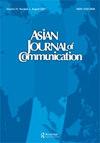Explaining change in independence–unification views in Taiwan: a within-between model
IF 1.5
2区 文学
Q2 COMMUNICATION
引用次数: 2
Abstract
ABSTRACT Independence–unification (IU) views have been profoundly influential in Taiwan politics. This study uses the rally ‘round the flag effect to explain the increase in support for Taiwan independence after President Tsai Ing-wen rejected China's ‘one country, two systems' proposal. Taking advantage of within-individual differences in panel data, we can estimate the probability of IU views given a set of certain characteristics compared with other values of those characteristics and ascertain the influence of change in variables such as approval of the president's handling cross-Strait relations at different time points. Our preliminary results show that Taiwanese people indeed change their IU views due to the external and domestic environment. People who perceive that the economy has improved and whose views on President Tsai have become more favorable tend to flock towards the independence side. People whose views of President Tsai’s handling of cross-Strait relations have become more favorable also move towards independence. If we only consider differences between individuals, feelings about the KMT and DPP stand out as significant predictors of IU views.台湾独统观变化的解释:一种介于两者之间的模式
摘要独立统一观对台湾政治产生了深远的影响。 利用面板数据中的个体内部差异,我们可以估计给定一组特定特征的IU观点与这些特征的其他值相比的概率,并确定变量变化的影响,例如总统在不同时间点处理两岸关系的批准。我们的初步结果表明,台湾人确实因外部和国内环境而改变了他们对IU的看法。那些认为经济已经改善,对蔡总统的看法变得更加有利的人往往会涌向独立派。对蔡总统处理两岸关系的看法越来越有利的人也走向独立。如果我们只考虑个人之间的差异,对国民党和民进党的感受是IU观点的重要预测因素。
本文章由计算机程序翻译,如有差异,请以英文原文为准。
求助全文
约1分钟内获得全文
求助全文
来源期刊

Asian Journal of Communication
COMMUNICATION-
CiteScore
3.70
自引率
0.00%
发文量
38
期刊介绍:
Launched in 1990, Asian Journal of Communication (AJC) is a refereed international publication that provides a venue for high-quality communication scholarship with an Asian focus and perspectives from the region. We aim to highlight research on the systems and processes of communication in the Asia-Pacific region and among Asian communities around the world to a wide international audience. It publishes articles that report empirical studies, develop communication theory, and enhance research methodology. AJC is accepted by and listed in the Social Science Citation Index (SSCI) published by Clarivate Analytics. The journal is housed editorially at the Wee Kim Wee School of Communication and Information at Nanyang Technological University in Singapore, jointly with the Asian Media Information and Communication Centre (AMIC).
 求助内容:
求助内容: 应助结果提醒方式:
应助结果提醒方式:


